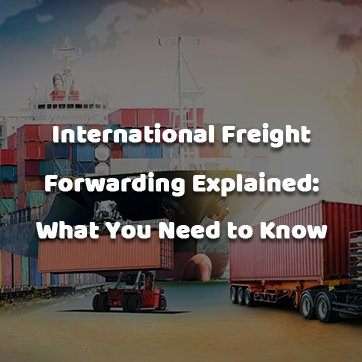
As businesses expand their reach into international markets, navigating the complexities of global freight transportation becomes increasingly critical. Shipping services play a crucial role in this complex web of global trade. Selecting the optimal international freight forwarder is pivotal to the success of shipping operations. The decision significantly impacts cost, efficiency, and overall customer satisfaction. This detailed guide will explain everything you need about this vital service.
What is International Freight Forwarding?
International freight forwarding is coordinating the shipment of goods from one country to another on behalf of shippers. Freight forwarders act as intermediaries between shippers and various transportation services, such as ocean shipping, air freight, trucking, and rail freight. They manage the logistics necessary to ensure that goods arrive at their destination on time and in excellent condition.
Key Responsibilities of Freight Logistics
They play a crucial role in ensuring the seamless movement of goods across international borders. Their responsibilities and tasks are multifaceted, encompassing various logistics, documentation, and customer service aspects. Below is a detailed breakdown of the core responsibilities and functions of freight forwarders:
- Logistics Management
- Route Planning: Choosing the most efficient and cost-effective routes for shipping goods, considering factors such as transit time, costs, and the nature of the cargo.
- Carrier Selection: Choosing the best carriers (airlines, shipping lines, trucking companies) based on reliability, cost, and service quality.
- Scheduling: Coordinating the timing of shipments to meet delivery deadlines and ensure timely arrival.
- Documentation
- Export Documentation: Preparing and managing all necessary export documents, including commercial invoices, packing lists, and certificates of origin.
- Import Documentation: Ensure the correct completion and submission of all import documents, including customs declarations.
- Bills of Lading: Issuing and managing bills of lading, which serve as a receipt of shipment and a document of title.
- Customs Clearance
- Customs Declarations: Preparing and submitting accurate customs declarations to ensure compliance with regulations.
- Duties and Taxes: Calculate and pay applicable duties, taxes, and tariffs on the shipper’s behalf.
- Compliance: Ensuring all shipments comply with the origin and destination countries’ customs regulations and trade laws.
- Cargo Insurance
- Risk Assessment: Evaluating the risks of transporting goods and advising clients on suitable insurance options.
- Insurance Arrangements: Organizing cargo insurance to protect against potential losses or damages during transit.
- Claims Handling: Assisting clients in filing claims for lost, damaged, or stolen goods.
- Warehouse and Distribution
- Storage Solutions: Providing warehousing services for temporarily storing goods before, during, or after transit.
- Inventory Management: Managing inventory levels, tracking goods, and coordinating warehouse stock movement.
- Distribution: Organizing the distribution of goods from warehouses to final destinations, ensuring timely delivery.
- Transportation Coordination
- Multi-modal Transport: Coordinating different modes of transport (air, sea, road, rail) to optimize the shipping process.
- Tracking and Tracing: Implementing tracking systems to monitor shipments’ progress and provide clients with real-time updates.
- Load Consolidation: Consolidating smaller shipments into larger loads reduces costs and improves efficiency.
- Customer Service
- Client Consultation: Advise clients on the best shipping options, routes, and carriers to meet their needs.
- Problem Resolution: Address any issues during transit, such as delays, damage, or lost shipments, and find solutions to mitigate them.
- Communication: Maintaining open lines of communication with clients, providing regular updates, and responding to inquiries promptly.
- Regulatory Compliance
- Trade Regulations: Staying up-to-date with international trade regulations, embargoes, and sanctions that may affect shipments.
- Safety Standards: Ensuring all shipments comply with safety standards and regulations, particularly for hazardous materials.
- Environmental Regulations: Adhering to environmental regulations and promoting sustainable shipping practices.
- Financial Management
- Cost Estimation: Providing clients with accurate shipping cost estimates, including freight charges, duties, taxes, and insurance.
- Invoicing and Payments: Managing the invoicing and payment processes, ensuring timely fee collection and expense settlement.
- Financial Reporting: Preparing financial reports related to shipping operations, costs, and profitability.
Types of Freight Forwarding Services
- Air Freight: Ideal for time-sensitive shipments, air freight is faster but generally more expensive than other modes. It is often used for high-value or perishable goods.
- Ocean Freight: This is the most common method for international shipping due to its cost-effectiveness for large volumes of goods. It includes the Full Container Load (FCL) and Less than Container Load (LCL) options.
- Road Freight: For shorter distances, road freight is essential for transporting goods to and from ports, airports, and distribution centers.
- Rail Freight: Rail is a reliable and environmentally friendly option for transporting goods over long distances on land, particularly within and between continents like Europe and Asia.
Benefits of Using a Freight Forwarding Company
- Expertise and Knowledge: They have extensive knowledge of international shipping regulations, documentation, and best practices. Complying with rules helps avoid costly delays.
- Cost Savings: By negotiating rates with carriers and optimizing shipping routes, freight forwarders can often secure better pricing than shippers could on their own.
- Risk Management: With their experience, they can anticipate and mitigate potential risks, ensuring the safe and efficient handling of goods.
- Time Efficiency: Managing international shipping logistics can be time-consuming. These companies take care of these tasks, allowing businesses to focus on their core operations.
Choosing the Right Freight Forwarder
Consider the following factors when choosing a freight forwarder:
- Experience and Reputation: Choose a Shipping forwarder with a proven track record and positive reviews. Industry experience is crucial for navigating complex logistics.
- Network of Partners: A vast network of partners and agents in key locations can facilitate smoother shipping processes and better local support.
- Range of Services: Ensure the forwarder provides the specific services you require, such as air, ocean, road, or rail freight.
- Customer Service: Responsive and transparent communication is vital. Choose a forwarder who keeps you informed and addresses any concerns promptly.
Challenges in International Freight Forwarding
- Customs Delays: If not appropriately managed, navigating different countries’ varying customs regulations and procedures can lead to delays.
- Political and Economic Instability: Changes in trade policies, tariffs, and economic conditions can impact shipping routes and costs.
- Environmental Factors: Weather, natural disasters, and other environmental factors can disrupt transportation schedules.
- Technological Changes: Keeping up with advancements in shipping technology and digital logistics platforms requires continuous adaptation.
Reliable International Freight Forwarder Companies!
International freight forwarding is an indispensable part of global trade, ensuring that goods move smoothly across borders. By carefully evaluating these factors and conducting due diligence, you can select a freight forwarder that aligns with your business objectives and delivers exceptional results. Whether you’re a small business venturing into international markets or a large corporation managing complex supply chains, partnering with a reliable freight forwarding company like FAITH LOGISTICS PTE LTD can be the key to successful and efficient global trade.

